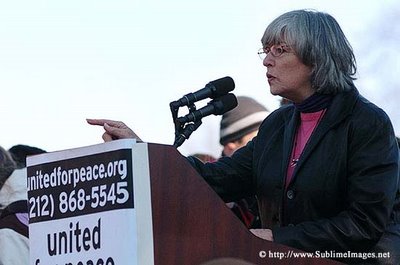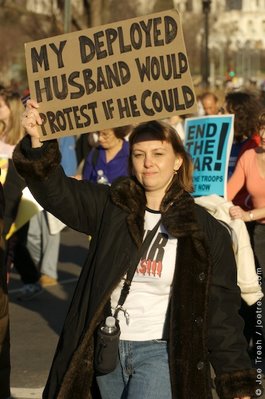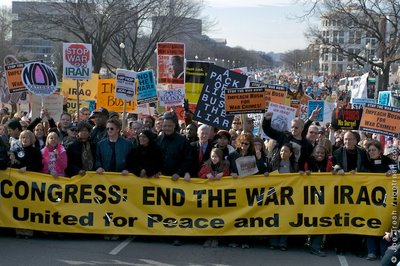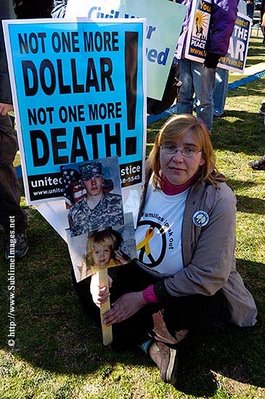Out of Iraq in 6 Months Flat! PART 1

Representative Lynn Woolsey speaking at the UFPJ rally in Washington DC 1/27/07 (Click image to enlarge)
Photo by Thaddeus Harrington © 2007
California Congresspeople have stepped up to the plate!! I'm proud to report that Representatives Barbara Lee (D-Oakland), Maxine Waters (D-Los Angeles), Diane Watson (D-Los Angeles), Bob Filner (D-San Diego) all co-sponsored Lynn Woolsey's (D-Petaluma) solution to the Bush disaster in Iraq.
It's called House Resolution 508 and I've broken it up into a four-part series so it's easier to read. This is a clear plan to get our troops safely out of Iraq in 6 months!!! Please contact your Congressperson and tell them to vote YES on this bill. Senator Russ Feingold is working on a similar bill, tell your two Senators to support it. WE THE PEOPLE need to keep the pressure on Congress. They need to know that the November 2006 election wasn't some fluke, it was a mandate from the American people that we want this war in Iraq ended now!
Find your House Representative Here
Find your Senators Here
Tell them more than once. Phone, fax, email their offices (all their offices) and until they vote on this urgent, crucial piece of legislation you must keep at them. They work for you and if they don't hear from you, they'll do whatever the big money guys tell them to do. Chances are it will be the opposite of what you want done.
Out of Iraq in 6 Months
by Representative Lynn Woolsey

Representative Maxine Waters speaking at the UFPJ rally in Washington DC 1/27/07 (Click image to enlarge)
Photo by Thaddeus Harrington © 2007
TEXT OF HR 508 PART 1
A BILL
To require United States military disengagement from Iraq, to provide United States assistance for reconstruction and reconciliation in Iraq, and for other purposes.
SECTION 1. SHORT TITLE; TABLE OF CONTENTS.
(a) Short Title- This Act may be cited as the `Bring the Troops Home and Iraq Sovereignty Restoration Act of 2007'.
(b) Table of Contents- The table of contents for this Act is as follows:
Sec. 1. Short title; table of contents.
TITLE I--UNITED STATES MILITARY DISENGAGEMENT FROM IRAQ
Sec. 101. Findings.
Sec. 102. Statement of policy.
Sec. 103. Repeal of Public Law 107-243.
Sec. 104. Disengagement of United States Armed Forces and contractor security forces from Iraq.
Sec. 105. Prohibition on permanent United States military installations in Iraq.
Sec. 106. Provision of Iraqi police and home guards training.
Sec. 107. Deployment of international stabilization force to Iraq.
Sec. 108. Limitation on total number of United States Government personnel at United States Embassy in Baghdad, Iraq.
Sec. 109. Prohibition on production sharing agreements for Iraqi petroleum resources.

Marjorie McKelvy displays a sign for her husband Sean, deployed in Iraq, while marching at the UFPJ March on Washington to End the Iraq War. 1/27/07
Photo by JoeTresh © 2007 (Click image to enlarge).
TITLE I--UNITED STATES MILITARY DISENGAGEMENT FROM IRAQ
SEC. 101. FINDINGS.
Congress finds the following:
(1) The brave men and women of the United States Armed Forces continue to serve with distinction in Iraq and have earned the respect and gratitude of the American people.
(2) On May 1, 2003, under a banner displaying the words `Mission Accomplished,' President George W. Bush stated: `Major combat operations in Iraq have ended.'. At that point, the occupation of Iraq began.
(3) The civilian leadership at the Department of Defense has failed to adequately support United States Armed Forces in Iraq, which were not trained to carry out an occupation and did not receive the proper equipment to achieve their stated mission.
(4) The occupation of Iraq has made the United States economically and militarily weaker, has made the United States less safe because it has enhanced the recruitment of terrorists, and has diminished America's prestige and influence in the world.
(5) Iraq is embroiled in a civil war characterized by daily occurrences of retaliation and revenge, fueled by the occupation of Iraq by United States Armed Forces. The civil war in Iraq was predicted by United States military commanders before the 2003 occupation of Iraq.
(6) The United States has pursued military action rather than diplomatic alternatives in Iraq, and has reduced reconstruction efforts in Iraq.
(7) On May 13, 2003, the President stated, `We will stay as long as necessary to make sure that the Iraqi people have a government of, by and for the Iraqi people. And then we'll come home.'.
(8) On December 15, 2005, the Iraqi people participated in elections to directly elect a full-term government. Iraqi Prime Minister Nouri al-Maliki and other high-ranking Iraqi Government officials, as well as leaders from the Sunni, Shiite, and Kurdish communities in Iraq, have since called for a timetable for the withdrawal of United States Armed Forces from Iraq.
(9) Iraqi Prime Minister Nouri al-Maliki has stated that Iraqi political leaders must bring security and stability to Iraq.
(10) During the summer of 2006, General George Casey, the top United States military commander in Iraq, proposed a plan for the deployment from Iraq of a substantial portion of United States Armed Forces and briefed the President accordingly.
(11) United States military commanders in Iraq have repeatedly stated that there is no military solution to the turmoil in Iraq.
(12) In the United States elections held on November 7, 2006, the American people clearly voted for a change in United States policy in Iraq and in favor of United States military disengagement from Iraq.

The UFPJ March on Washington to End the Iraq War is led by a front row of people that included Sean Penn, Jesse Jackson, Susan Sarandon, and Tim Robbins. 1/27/07
Photo by JoeTresh © 2007 (Click image to enlarge).
SEC. 102. STATEMENT OF POLICY.
Congress declares that it is the policy of the United States--
(1) to end the occupation of Iraq on the basis of the findings specified in section 101;
(2) to accelerate the training and equipping of the military and security forces of the Government of Iraq;
(3) to pursue security and stability in Iraq through diplomacy;
(4) to help preserve the territorial integrity of Iraq as a nation state;
(5) to take all appropriate measures to account for any missing members of the United States Armed Forces or United States citizens in Iraq; and
(6) to turn over all internal security activities and military operations in Iraq to the elected Government of Iraq not later than the end of the six-month period beginning on the date of the enactment of this Act.
SEC. 103. REPEAL OF PUBLIC LAW 107-243.
The Authorization for Use of Military Force Against Iraq Resolution of 2002 (Public Law 107-243; 50 U.S.C. 1541 note) is hereby repealed.
SEC. 104. DISENGAGEMENT OF UNITED STATES ARMED FORCES AND CONTRACTOR SECURITY FORCES FROM IRAQ.
(a) Withdrawal of Armed Forces- Not later than the end of the six-month period beginning on the date of the enactment of this Act, all United States Armed Forces serving in Iraq as part of Operation Iraqi Freedom shall be withdrawn from Iraq and returned to the United States or redeployed outside of the Middle East. It is the policy of Congress that this withdrawal shall commence as soon as practicable after the date of the enactment of this Act to ensure completion of the withdrawal by the end of such six-month period.
(b) Withdrawal of Contractor Security Forces- Not later than the end of the six-month period beginning on the date of the enactment of this Act, all security forces under contract or subcontract with the United States Government and working in Iraq shall be withdrawn from Iraq. The contract or subcontract providing for the use of such security forces shall be terminated as soon as practicable after the forces are withdrawn.
(c) Prohibition on Use of Funds To Continue Deployment of Armed Forces in Iraq-
(1) PROHIBITION- Except as provided in paragraph (2), funds appropriated or otherwise made available under any provision of law may not be obligated or expended to deploy or continue to deploy members or units of the United States Armed Forces to Iraq as part of Operation Iraqi Freedom.
(2) EXCEPTIONS- Paragraph (1) does not apply to the use of funds--
(A) to provide for the safe and orderly withdrawal of the Armed Forces and contractor security forces from Iraq pursuant to subsections (a) and (b); or
(B) to ensure the security of Iraq and its transition to democratic rule by--
(i) carrying out consultations with the Government of Iraq, other foreign governments, the North Atlantic Treaty Organization, the United Nations, and other international organizations; or
(ii) providing financial assistance or equipment to Iraqi security forces and international forces in Iraq.
(d) Rule of Construction- Nothing in this section shall be construed to prohibit or otherwise restrict the use of funds available to any department or agency of the United States, other than the Department of Defense, to carry out social and economic reconstruction activities in Iraq.
(e) Armed Forces Defined- In this section, the term `Armed Forces' has the meaning given the term in section 101(a)(4) of title 10, United States Code.

Protesters march along Independence Avenue at the UFPJ March on Washington to End the Iraq War. 1/27/07
Photo by JoeTresh © 2007 (Click image to enlarge).
SEC. 105. PROHIBITION ON PERMANENT UNITED STATES MILITARY INSTALLATIONS IN IRAQ.
(a) Prohibition- No permanent or long-term military installation, which is designed or intended to be occupied by a unit of the United States Armed Forces after the withdrawal of the Armed Forces from Iraq pursuant to section 104(a), may be constructed in Iraq.
(b) Transfer of Military Facilities- The President of the United States shall transfer to the Government of Iraq all right, title, and interest held by the United States in any military facility in Iraq that was constructed, repaired, or improved using amounts appropriated to the Department of Defense and occupied by a unit of the United States Armed Forces.
SEC. 106. PROVISION OF IRAQI POLICE AND HOME GUARDS TRAINING.
During the six-month period specified in subsections (a) and (b) of section 104 for the withdrawal of United States Armed Forces and contractor security forces from Iraq, the Secretary of Defense may use members of the Armed Forces and security forces under contract or subcontract with the Department of Defense to assist in the training of a permanent Iraqi police force and neighborhood, village, and tribal home guards comprised of Iraqi citizens.
SEC. 107. DEPLOYMENT OF INTERNATIONAL STABILIZATION FORCE TO IRAQ.
(a) Deployment- If requested by the Government of Iraq (including with the support of the National Assembly of Iraq), the President of the United States is authorized to support the deployment of an international stabilization force to Iraq to enhance public security in Iraq after the withdrawal of United States Armed Forces from Iraq pursuant to section 104(a).
(b) Sense of Congress- It is the sense of Congress that the deployment of the international stabilization force to Iraq described in subsection (a) should commence not later than the end of the six-month period beginning on the date of the enactment of this Act and terminate not later than the end of the two-year period beginning on the date of commencement of such deployment.

Woman with sign at the UFPJ rally in Washington DC 1/27/07 (Click image to enlarge)
Photo by Thaddeus Harrington © 2007
SEC. 108. LIMITATION ON TOTAL NUMBER OF UNITED STATES GOVERNMENT PERSONNEL AT UNITED STATES EMBASSY IN BAGHDAD, IRAQ.
(a) Limitation- Notwithstanding any other provision of law, the total number of officers and employees of the United States Government assigned to the United States Embassy in Baghdad, Iraq, may not exceed 500 individuals.
(b) Effective Date- Subsection (a) shall take effect beginning six months after the date of the enactment of this Act.
SEC. 109. PROHIBITION ON PRODUCTION SHARING AGREEMENTS FOR IRAQI PETROLEUM RESOURCES.
(a) Prohibition- On or after the date of the enactment of this Act, no department, agency, or other entity of the Government of the United States and no national of the United States may enter into a contract for the development, production, or marketing of petroleum resources in Iraq.
(b) Sunset- Subsection (a) shall cease to be effective beginning on the date on which the President of the United States certifies to Congress that the Government of Iraq has established and is enforcing laws that provide for the regulation of activities of foreign governments and foreign nationals pursuant to contracts for the development, production, or marketing of petroleum resources in Iraq.
(c) Definition- In this section, the term `national of the United States' means--
(1) a natural person who is a citizen of the United States or who owes permanent allegiance to the United States or is an alien lawfully admitted for permanent residence in the United States, as defined in section 101(a)(20) of the Immigration and Nationality Act (8 U.S.C. 1101(a)(20)); or
(2) a corporation, partnership, or other business association that is organized under the laws of the United States, any State or territory thereof, or the District of Columbia.
End of Part 1 of HR 508. More to follow.
ARTIST NOTES:
Thaddeus Harrington
I was overwhelmed by the gathering of people, many from outside the DC metro area, affected in some way by our nation’s wars, specifically Iraq. It feels good to know that many American’s have not been sedated by watered-down media outlets; demanding that the government not neglect the wants of the governed. Many thanks to the defenders of our constitution stateside and worldwide. Peace.JoeTresh wrote the captions below his photographs which appear in this blog installment.
Please respect the work of the artists you see here and be sure to credit them when you share their artwork with others.
To share your opinion on this or any other post, please click the word "COMMENTS" below.




0 Comments:
Post a Comment
<< Home